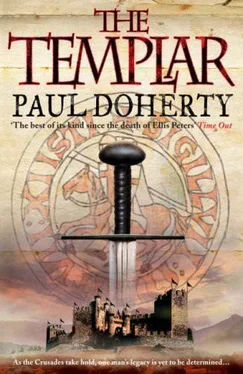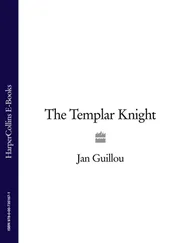P. Doherty - The Templar
Здесь есть возможность читать онлайн «P. Doherty - The Templar» весь текст электронной книги совершенно бесплатно (целиком полную версию без сокращений). В некоторых случаях можно слушать аудио, скачать через торрент в формате fb2 и присутствует краткое содержание. Год выпуска: 2010, ISBN: 2010, Издательство: Minotaur Books, Жанр: Исторические приключения, на английском языке. Описание произведения, (предисловие) а так же отзывы посетителей доступны на портале библиотеки ЛибКат.
- Название:The Templar
- Автор:
- Издательство:Minotaur Books
- Жанр:
- Год:2010
- ISBN:9780312576837
- Рейтинг книги:5 / 5. Голосов: 1
-
Избранное:Добавить в избранное
- Отзывы:
-
Ваша оценка:
- 100
- 1
- 2
- 3
- 4
- 5
The Templar: краткое содержание, описание и аннотация
Предлагаем к чтению аннотацию, описание, краткое содержание или предисловие (зависит от того, что написал сам автор книги «The Templar»). Если вы не нашли необходимую информацию о книге — напишите в комментариях, мы постараемся отыскать её.
The Templar — читать онлайн бесплатно полную книгу (весь текст) целиком
Ниже представлен текст книги, разбитый по страницам. Система сохранения места последней прочитанной страницы, позволяет с удобством читать онлайн бесплатно книгу «The Templar», без необходимости каждый раз заново искать на чём Вы остановились. Поставьте закладку, и сможете в любой момент перейти на страницу, на которой закончили чтение.
Интервал:
Закладка:
Eleanor now regretted what she called her miasma of fear. She drew strength especially from Theodore. Instead of talking about the siege, he chattered constantly about his own dreams of a whitewashed villa set in vineyards with orchards full of pears, apples and almonds alongside fields burgeoning with millet and wheat. The Greek won Eleanor over with his vision of life, of ordinary things, peace and stillness. Eleanor reflected and vowed that she would come through this nightmare to find her own salvation. What could misery and despair achieve? Tomorrow always brought new hope. So she struggled along with the rest, even boiling leather straps to fashion a weak soup. She foraged with the other women, grubbing for shoots and roots, anything that could be cooked in boiling water.
Advent came. Bohemond planned a great foraging expedition to bring in supplies. It ended in disaster. His company was ambushed even as the rest of the army were attacked by Turkish horsemen; they streamed into the camp, slicing and cutting, casting firebrands and loosing flame-edged arrows into the tents. Eleanor, now resolute, grasped a pike and fought alongside the other women. What did she care if Christmas had come and gone? Here was her life, squelching in mud, pike out, jabbing at horsemen in billowing robes who thundered past her. Nevertheless, when the attack ended, wise-thinking heads brought important issues to the fore. Bohemond had left to forage and been ambushed. At the same time Yaghi Siyan had quickly learnt that Bohemond was absent and dispatched his raiders to wreak hideous damage in the camp.
‘Strange,’ people murmured, ‘how the infidels were so closely informed about what was happening.’
The new year of 1098, as Eleanor reflected in her chronicle, brought little cheer. The portents for the future looked dismal. The threat of total and absolute failure swept the camp. Eleanor realised it might all be coming to an end but took comfort in the belief that she had done her best. She could do no more, so she and Simeon spent their time chronicling the past and ignoring the future. She wished Hugh and Godefroi would visit her, but they had become virtual strangers, until one January night when Hugh swept into her stinking goatskin tent, and asked her and Simeon to join a secret council convened by Count Bohemond. At first Eleanor objected, but Hugh grasped her by the shoulders.
‘Eleanor,’ he hissed, ‘times have changed. No more sword! More wit, more wisdom! Come with us.’
He led her and Simeon across the bleak, foul-smelling camp to Bohemond’s tent. Inside, the Norman, dressed in a furred robe, his long yellow hair falling down either side of his face, sprawled on cushions talking quietly to Theodore and Godefroi. He paused as Eleanor entered, remembered his manners, scrambled to his feet and gave the most elaborate bow before gesturing at the heap of cushions and bolsters prepared for them. Eleanor sat down. She stared at the great Norman; those piercing blue eyes in the ruddy, weatherbeaten face glared back. Bohemond could never stay still; now he turned and fidgeted. Occasionally he would glance at her lecherously, look away, then stare piteously as if beseeching her help. Wine was poured, precious sweetmeats served. Bohemond waited until the tent emptied of servants before getting to his feet. He went outside, breathing noisily as he stared around, ensuring no eavesdropper lurked. When he returned, he flopped down on to the cushions and jabbed a stubby finger at Eleanor.
‘You are our Trojan horse.’
She stared steadily back.
‘The Trojan horse: you know the story?’ he asked.
Eleanor nodded.
‘We cannot take Antioch.’ Bohemond shook his head. ‘Not by storm or by stealth. Remember the Antiochene boast, that their city can only be captured by starvation, surprise or treachery. We have decided upon treachery.’ His powerful face creased into a smile, then he tapped his chest as if confessing his sins. ‘Well, not all of us, just me.’
‘My lord,’ Eleanor spoke up, ‘what need of me? You talk of stealth and treachery. How can I assist you in that?’
‘Oh, very easily.’ Bohemond pulled himself up and stretched, and Eleanor realised why he was such a fearsome figure amongst the Franks. He was square-shouldered, slim-waisted, a powerful, deep-chested man, his long square face framed by that yellow hair, those eyes, icy blue, constantly moving, constantly searching. She stared round the tent at the various scraps of armour and harness, weapons piled in a tangle, manuscripts tossed in a heap. Here, Eleanor reflected, was a man eager to grasp something, anything. At first Bohemond acted the blustering soldier, revelling in his own achievements, pretending to be drunk, cursing the other leaders, describing how he would have arranged matters. As Eleanor sat and watched, she realised that Bohemond was a very dangerous man. He acted as if he was tipsy, yet he was cold-stone sober. He clasped Godefroi and Hugh as if they were comrades-in-arms, then he would move on to a story about his father or his brothers, his wars in Sicily and his hatred for the Greeks, before returning to the siege. Eleanor realised he was trying to prepare her as a man would seduce a woman, offering signs of his bluntness and honesty, his desire to do what was right. What also emerged was his deep hunger for Antioch. He had seen the city and wanted it for himself. He’d realised he couldn’t take it by force so he would try other means. He stopped abruptly halfway through a tirade against Godfrey of Bouillon and glared at her.
‘Eleanor, you want to save your soul?’
‘It is already saved, my lord,’ she answered. ‘Christ’s blood has bought it.’
That confused him. He blinked, slurped from his goblet and slammed it down. He glanced at Hugh and Godefroi then at Theodore, Simeon and Eleanor. At last, as if tired of the pretence, he moved his hand across his face, stroking his brow, eyes closed tight.
‘If we don’t take Antioch,’ he said slowly, ‘we might as well go home.’
Eleanor, tired, exasperated at this meeting, which seemed to be leading nowhere, lost her temper.
‘My lord, why are we here?’
Bohemond’s head went down, that glorious mane of hair shrouding his face, then glanced up. ‘I am asking you to sacrifice yourself,’ he said. ‘All right.’ He pushed his hands forward, palms towards her, fingers extended in the sign of peace. ‘I’ve blustered, I’ve bragged, I’ve threatened, I’ve promised, but at the end of the day, Eleanor de Payens, I need you. Now I can sit here and give you sweet verses from the troubadours, lines from the poets-’
‘My lord, why are we here?’ Eleanor insisted, ‘What do you want from me?’ She glared at Hugh, who looked away. Godefroi, embarrassed, simply stared down at the floor and shuffled his cup. Simeon plucked nervously at his jerkin. Theodore sat, one hand over the lower part of his face, as if he sensed what was coming.
‘Very well.’ Bohemond took a deep breath. ‘We will never take Antioch by force. We can build towers, we can launch forays, this, that and the other. The Turks know exactly what we are doing. They have spies amongst us. If I discovered who they were, I would take them out myself, drag them down to the river bank and pluck their heads as a farmer would a flower, but what is the use of that?’ He smiled at Eleanor. ‘Terror without a reason is diabolic; terror with a reason is understandable, it’s logical. Now, Eleanor, this is what I plot. I want spies to go into Antioch, and this is how it can be done. Theodore is a Greek mercenary. He will enter the city with his wife, namely you. He will claim he has had enough of the Frankish army and wants to sell his sword to the victorious party. If he brings the sister of a high-ranking Frankish knight, together with her scribe and maidservant, people might accept that he is speaking the truth. In a word, Eleanor, you, Theodore, Simeon and Imogene will enter Antioch as our spies. Once there you will seek out someone, anyone, who will betray part of that wall to us.’
Читать дальшеИнтервал:
Закладка:
Похожие книги на «The Templar»
Представляем Вашему вниманию похожие книги на «The Templar» списком для выбора. Мы отобрали схожую по названию и смыслу литературу в надежде предоставить читателям больше вариантов отыскать новые, интересные, ещё непрочитанные произведения.
Обсуждение, отзывы о книге «The Templar» и просто собственные мнения читателей. Оставьте ваши комментарии, напишите, что Вы думаете о произведении, его смысле или главных героях. Укажите что конкретно понравилось, а что нет, и почему Вы так считаете.












